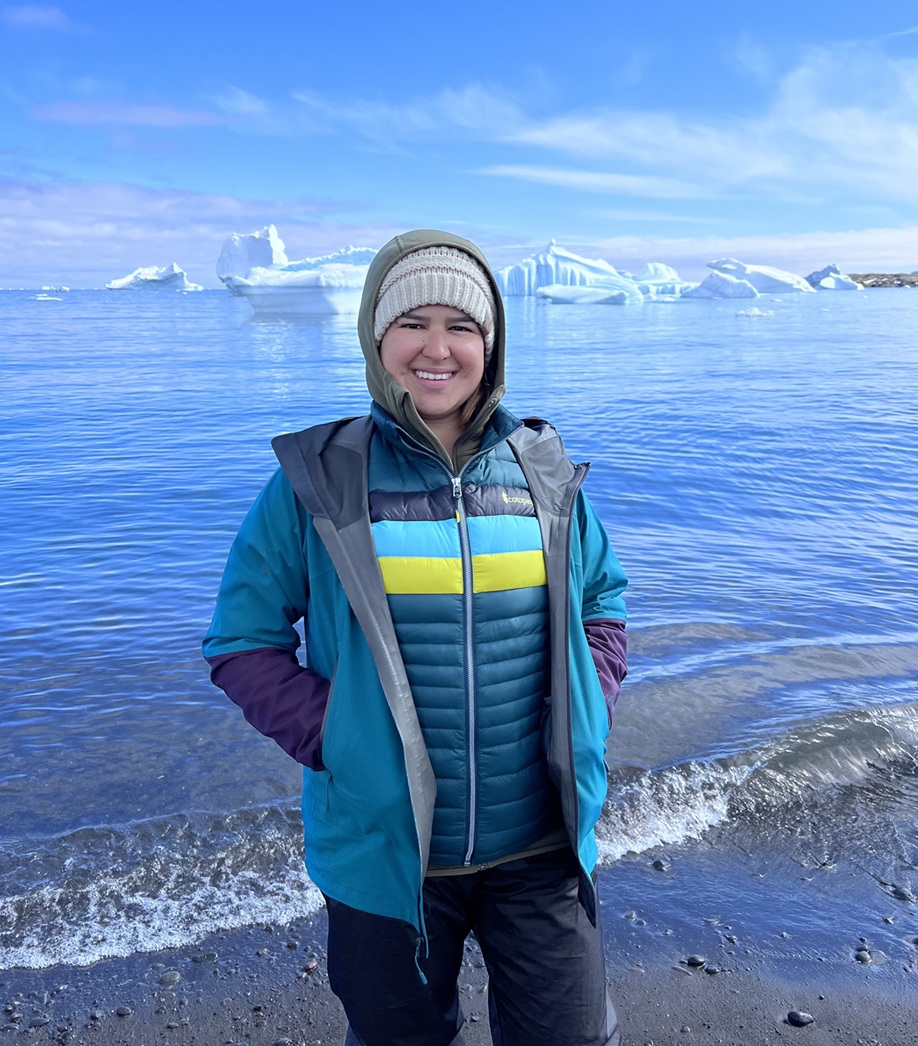Before joining the M.A. in Climate and Society program, Lina Maria Villegas spent several years as a military and contract linguist, learning an entirely new language and culture—an experience that awakened her curiosity about the world and led her back to school for geographic sciences at the University of Maryland.
Now, Villegas is studying a different language—that of environmental policy and climate science. She also serves as vice president of internal affairs for the Columbia Climate student government and a member of Student Leadership Engagement Initiative. She is currently a research assistant with NASA’s Climate Change Research initiative, in collaboration with CUNY, helping to characterize the urban land surface temperature in NYC. Read more about Villegas’ roundabout journey to the Climate School in the Q&A below.

Tell us a bit about how you became interested in the climate space.
In elementary school, I remember talks in the auditorium about electricity and small things to be conscious of, like leaving the light on in the room when you walk away or turning the water off when you brush your teeth. I became the little environmentalist in our house—following everybody around, turning off all the lights. Ever since then, I’ve been more and more aware of different ways our actions have an impact on the world around us.
I started carrying around a reusable water bottle eight years ago. When I’d see friends and colleagues holding plastic water bottles, I’d sometimes ask if they’d considered switching to a reusable water bottle—but not in any judgmental way, or by making anybody feel bad for their choices. Most of them would say no. And I’d say, ‘well, if you think about it, you use at least one water bottle a day for X amount of years. I’ve been carrying this around for eight years. Multiply that by a water bottle a day, think about how much you could save if you switched.’
Do you think individual climate actions make a difference?
A podcast I listened to a while ago talked about the debate between small and large actions, or personal actions and corporate entities, and do we actually make a difference as individuals? It argued for both sides. What stuck with me the most was that our actions might be a drop of water, but water creates ripple effects. Me, carrying around a water bottle, having this conversation with friends and colleagues—I know a bunch of people who have made small changes because of that. It creates this large community of awareness. You don’t know how far it could reach.
What led you from this realization to your studies in climate?
For the longest time, I didn’t know what I wanted to study. I thought I wanted to be a veterinarian, but I lost the scholarship I had and didn’t want to get into debt. So I joined the military. I figured I would gain some exposure there to see what I want to pursue in life. Or I would get my school paid for, so win-win. I worked as a linguist for six years with the military, and another year and a half as a contractor.
But I felt unhappy and unfulfilled. I decided to follow my passion for environmentalism. I originally went to the University of Maryland (UMD) for environmental science, but found that there was a lot more chemistry and math than I wanted to do as a returning student. Geographical sciences, on the other hand, did not involve that and also had maps, which I’ve always loved.
I had a guest lecturer at UMD who happened to be an alumna of the Columbia Climate School. I heard about all the amazing things the school was doing, and I knew I wanted to be a part of that.
How did your varied background and experience shape your path to the Climate School?
The language I learned was Pashtu, which is from Afghanistan. It is not widely used, so I haven’t been able to practice it much since, but I love the language, people, culture and experience that I had. Getting to learn a whole new language and culture that I’d never really looked at broadened my horizons, and my love for learning and curiosity really grew there.
As an undergrad, I also had the opportunity to do a study abroad in Copenhagen. The class was Climate Change and Arctic Ecosystems. We learned about how different ecosystems within the Arctic interact with one another, their status quo and how they’re affected by climate change. Part of the course was also learning how to generate our own studies. We got to go to Greenland for two weeks. I never thought a girl from Miami, Florida, would end up in Greenland in her lifetime. That whole experience was wonderful, and I got so much out of the fieldwork we did. That same summer, in 2022, I visited my friend in France. It was the middle of that heat wave with no air conditioner and then comparing that with Greenland, it really showed me how many changes are going on globally, and how differently prepared regions are.
What do you hope to take away from the M.A. in Climate and Society?
One of the things I realized while at UMD is the strong disconnect between science and policy. The scientists are discovering these things over here, and the politicians are making their decisions over there. But there’s not much of a bridge between the two, or it’s tenuous at best. I want to fill in that space to help generate more green opportunities in the future. Learning that urban populations are going to increase to 70% by 2050 compared with the current 50%, I also think about the impact more sustainable policies could have for people moving into these spaces and those who already exist in them.
In my first class at the Climate School, we talked about how ‘learning the architecture of the system is the best way to affect change in that system.’ I’m excited to learn all about that, because that’s not something I’ve been exposed to before. I’m excited about studying climate investment and policy with Lisa Sachs, and trying to look at the ‘wicked’ problems that we’re faced with today and possible solutions. I also want to learn from the other students with amazing backgrounds in climate. I’m kind of starstruck by what everyone’s been able to do in their lives thus far.
I think, being in the climate space, I need to have a positive outlook, or I couldn’t continue to do it. I call myself a forced optimist. I can’t just believe we’ve already reached the limit and hit the tipping points and there is no going back. I have to move forward and see what I can do and how I can help other people do what they need to do.




No Comments
Leave a comment Cancel